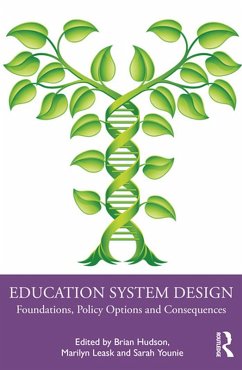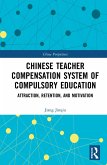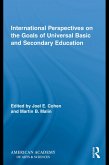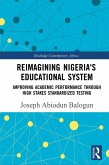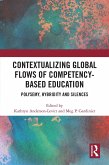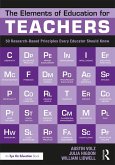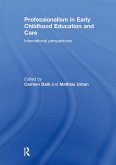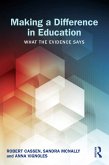Education System Design (eBook, PDF)
Foundations, Policy Options and Consequences
Redaktion: Hudson, Brian; Younie, Sarah; Leask, Marilyn
37,95 €
37,95 €
inkl. MwSt.
Sofort per Download lieferbar

19 °P sammeln
37,95 €
Als Download kaufen

37,95 €
inkl. MwSt.
Sofort per Download lieferbar

19 °P sammeln
Jetzt verschenken
Alle Infos zum eBook verschenken
37,95 €
inkl. MwSt.
Sofort per Download lieferbar
Alle Infos zum eBook verschenken

19 °P sammeln
Education System Design (eBook, PDF)
Foundations, Policy Options and Consequences
Redaktion: Hudson, Brian; Younie, Sarah; Leask, Marilyn
- Format: PDF
- Merkliste
- Auf die Merkliste
- Bewerten Bewerten
- Teilen
- Produkt teilen
- Produkterinnerung
- Produkterinnerung

Bitte loggen Sie sich zunächst in Ihr Kundenkonto ein oder registrieren Sie sich bei
bücher.de, um das eBook-Abo tolino select nutzen zu können.
Hier können Sie sich einloggen
Hier können Sie sich einloggen
Sie sind bereits eingeloggt. Klicken Sie auf 2. tolino select Abo, um fortzufahren.

Bitte loggen Sie sich zunächst in Ihr Kundenkonto ein oder registrieren Sie sich bei bücher.de, um das eBook-Abo tolino select nutzen zu können.
This book highlights decisions governments have to make about their public education systems, the options they have before them and the consequences of their decisions. As well as covering issues such as values, curriculum, teacher training, structures and so on, the book addresses education planning for epidemics, pandemics and disasters.
- Geräte: PC
- ohne Kopierschutz
- eBook Hilfe
- Größe: 2.63MB
Andere Kunden interessierten sich auch für
![Chinese Teacher Compensation System of Compulsory Education (eBook, PDF) Chinese Teacher Compensation System of Compulsory Education (eBook, PDF)]() Jiang JinqiuChinese Teacher Compensation System of Compulsory Education (eBook, PDF)41,95 €
Jiang JinqiuChinese Teacher Compensation System of Compulsory Education (eBook, PDF)41,95 €![International Perspectives on the Goals of Universal Basic and Secondary Education (eBook, PDF) International Perspectives on the Goals of Universal Basic and Secondary Education (eBook, PDF)]() International Perspectives on the Goals of Universal Basic and Secondary Education (eBook, PDF)54,95 €
International Perspectives on the Goals of Universal Basic and Secondary Education (eBook, PDF)54,95 €![Reimagining Nigeria's Educational System (eBook, PDF) Reimagining Nigeria's Educational System (eBook, PDF)]() Joseph A. BalogunReimagining Nigeria's Educational System (eBook, PDF)41,95 €
Joseph A. BalogunReimagining Nigeria's Educational System (eBook, PDF)41,95 €![Contextualizing Global Flows of Competency-Based Education (eBook, PDF) Contextualizing Global Flows of Competency-Based Education (eBook, PDF)]() Contextualizing Global Flows of Competency-Based Education (eBook, PDF)40,95 €
Contextualizing Global Flows of Competency-Based Education (eBook, PDF)40,95 €![The Elements of Education for Teachers (eBook, PDF) The Elements of Education for Teachers (eBook, PDF)]() Austin VolzThe Elements of Education for Teachers (eBook, PDF)30,95 €
Austin VolzThe Elements of Education for Teachers (eBook, PDF)30,95 €![Professionalism in Early Childhood Education and Care (eBook, PDF) Professionalism in Early Childhood Education and Care (eBook, PDF)]() Professionalism in Early Childhood Education and Care (eBook, PDF)54,95 €
Professionalism in Early Childhood Education and Care (eBook, PDF)54,95 €![Making a Difference in Education (eBook, PDF) Making a Difference in Education (eBook, PDF)]() Robert CassenMaking a Difference in Education (eBook, PDF)38,95 €
Robert CassenMaking a Difference in Education (eBook, PDF)38,95 €-
-
-
This book highlights decisions governments have to make about their public education systems, the options they have before them and the consequences of their decisions. As well as covering issues such as values, curriculum, teacher training, structures and so on, the book addresses education planning for epidemics, pandemics and disasters.
Dieser Download kann aus rechtlichen Gründen nur mit Rechnungsadresse in A, B, BG, CY, CZ, D, DK, EW, E, FIN, F, GR, HR, H, IRL, I, LT, L, LR, M, NL, PL, P, R, S, SLO, SK ausgeliefert werden.
Produktdetails
- Produktdetails
- Verlag: Taylor & Francis eBooks
- Seitenzahl: 324
- Erscheinungstermin: 26. November 2020
- Englisch
- ISBN-13: 9780429523311
- Artikelnr.: 60352111
- Verlag: Taylor & Francis eBooks
- Seitenzahl: 324
- Erscheinungstermin: 26. November 2020
- Englisch
- ISBN-13: 9780429523311
- Artikelnr.: 60352111
- Herstellerkennzeichnung Die Herstellerinformationen sind derzeit nicht verfügbar.
Brian Hudson is Emeritus Professor and former Head of the School of Education and Social Work (2012-16) at the University of Sussex, Honorary Professor and former Associate Dean for Research at the University of Dundee (2009-12) and currently Senior Professor at Karlstad University, Sweden. His particular research interests are in mathematics education, ICT and learning, curriculum studies and subject didactics. He is a board member and former chair of the Teacher Education Policy in Europe (TEPE) ( https://twitter.com/TEPEnetwork ); was the main organiser of the WERA ( www.weraonline.org ) International Research Network on Didactics -Learning and Teaching and is currently an Associate Editor of the Journal of Curriculum Studies. He was awarded a National Teaching Fellowship in 2004 and Honorary Network Membership of the European Education Research Association ( https://eera-ecer.de ) Network 27 on Didactics¿- Learning and Teaching in 2016. Marilyn Leask has held roles in central and local government, universities, schools and research institutes. She is visiting Professor at De Montfort and Winchester Universities, UK, and is committed to supporting international collaboration between teachers and educational researchers for the benefit of learners everywhere. In 1992, she initiated the Learning to Teach in the secondary school series of textbooks which she co-edits. She is co-chair of the Education Futures Collaboration Charity which oversees the MESHGuides initiative ( www.meshguides.org ) addressing the UN's SDG 4, and with Professor Younie and Ulf Lundin from Sweden, initiated the European SchoolNet in 1995 ( www.eun.org ). She is an elected board member of the Council for Subject Associations and the Technology Pedagogy and Education Association. She has previously held elected roles on the British Educational Research Association national council and the national council Universities Council for the Education of Teachers. Sarah Younie is Professor of Education Innovation and previous Director of the Institute for Education Futures at De Montfort University. She sits on ICET (International Council on Education for Teaching) and is the UK BERA (British Education Research Association) Convenor for Educational Research and Policy Making Special Interest Group. She is a Trustee and founder member of the Education Futures Collaboration (EFC) charity and MESH (Mapping Education Specialist knowHow) project, which provides research evidence to inform teachers' professional practice, and represents MESH on the international UNESCO Teacher Task Force panel. MESH contributes to UN SDG4. She has been involved in international research on technologies in education for UNESCO, EU, UK Government Agencies, Local Authorities and educational charities. As the UK Chair of the National Subject Association of IT in Teacher Education (ITTE) she has submitted evidence for Parliamentary Select Committees. Professor Younie is currently the Editor-in-Chief for the ¿international Journal of Technology, Pedagogy and Education.
Section 1 An Education Service for the Future: Values and Principles 1
Towards a Learning Education System? Globalisation, Change, Improvement and
Accountability in Uncertain Times 2 Aims and Values: Direction with Purpose
3 Developing Your Vision: Principles and Implementation Challenges Section
2 England: A Case Study, A Vision and A Cautionary Tale 4 A "National
Education Service": What Can We Learn From the Past? 5 Politics Aside: From
Fragmentation to Coherence 6 Education England: From Chaos to Consensus
Section 3 Issues of Social Justice and Inclusion 7 Social Mobility: A
Working Class View 8 Selection by Wealth, Ability and Aptitude, and Faith:
Good for a Country or Not? 9 School Segregation in England and the Logic of
Exiting from the Public Education System 10 Special Education Needs and
Disabilities 11 Adult and Further Education: The Impact of Austerity on
Life Chances and Well Being Section 4 Curriculum, Assessment, Leadership
and Accountability 12 The Curriculum: Developing Powerful Knowledge and
Creative Knowhow 13 National Assessment Choices 14 Leadership, Innovation
and Change 15 An Alternative Approach to Accountability and Inspection:
Evaluation for Improvements in Finnish Teacher Education 16 Accountability
Systems for Schools: Coercion or Cooperation? Section 5 Teacher Education
17 Reframing the Professionalism of Teachers 18 Initial Teacher Education:
What Matters Most and What Has Worked Well 19 CPD, Knowledge Services and
Research: 21st Century Solutions Section 6 Policy Options and Consequences
20 Policy Options and Consequences: What Has to be Done, When and With Whom
21 Education in Emergencies: pandemic/disaster planning for education
sector continuity
Towards a Learning Education System? Globalisation, Change, Improvement and
Accountability in Uncertain Times 2 Aims and Values: Direction with Purpose
3 Developing Your Vision: Principles and Implementation Challenges Section
2 England: A Case Study, A Vision and A Cautionary Tale 4 A "National
Education Service": What Can We Learn From the Past? 5 Politics Aside: From
Fragmentation to Coherence 6 Education England: From Chaos to Consensus
Section 3 Issues of Social Justice and Inclusion 7 Social Mobility: A
Working Class View 8 Selection by Wealth, Ability and Aptitude, and Faith:
Good for a Country or Not? 9 School Segregation in England and the Logic of
Exiting from the Public Education System 10 Special Education Needs and
Disabilities 11 Adult and Further Education: The Impact of Austerity on
Life Chances and Well Being Section 4 Curriculum, Assessment, Leadership
and Accountability 12 The Curriculum: Developing Powerful Knowledge and
Creative Knowhow 13 National Assessment Choices 14 Leadership, Innovation
and Change 15 An Alternative Approach to Accountability and Inspection:
Evaluation for Improvements in Finnish Teacher Education 16 Accountability
Systems for Schools: Coercion or Cooperation? Section 5 Teacher Education
17 Reframing the Professionalism of Teachers 18 Initial Teacher Education:
What Matters Most and What Has Worked Well 19 CPD, Knowledge Services and
Research: 21st Century Solutions Section 6 Policy Options and Consequences
20 Policy Options and Consequences: What Has to be Done, When and With Whom
21 Education in Emergencies: pandemic/disaster planning for education
sector continuity
Section 1 An Education Service for the Future: Values and Principles 1
Towards a Learning Education System? Globalisation, Change, Improvement and
Accountability in Uncertain Times 2 Aims and Values: Direction with Purpose
3 Developing Your Vision: Principles and Implementation Challenges Section
2 England: A Case Study, A Vision and A Cautionary Tale 4 A "National
Education Service": What Can We Learn From the Past? 5 Politics Aside: From
Fragmentation to Coherence 6 Education England: From Chaos to Consensus
Section 3 Issues of Social Justice and Inclusion 7 Social Mobility: A
Working Class View 8 Selection by Wealth, Ability and Aptitude, and Faith:
Good for a Country or Not? 9 School Segregation in England and the Logic of
Exiting from the Public Education System 10 Special Education Needs and
Disabilities 11 Adult and Further Education: The Impact of Austerity on
Life Chances and Well Being Section 4 Curriculum, Assessment, Leadership
and Accountability 12 The Curriculum: Developing Powerful Knowledge and
Creative Knowhow 13 National Assessment Choices 14 Leadership, Innovation
and Change 15 An Alternative Approach to Accountability and Inspection:
Evaluation for Improvements in Finnish Teacher Education 16 Accountability
Systems for Schools: Coercion or Cooperation? Section 5 Teacher Education
17 Reframing the Professionalism of Teachers 18 Initial Teacher Education:
What Matters Most and What Has Worked Well 19 CPD, Knowledge Services and
Research: 21st Century Solutions Section 6 Policy Options and Consequences
20 Policy Options and Consequences: What Has to be Done, When and With Whom
21 Education in Emergencies: pandemic/disaster planning for education
sector continuity
Towards a Learning Education System? Globalisation, Change, Improvement and
Accountability in Uncertain Times 2 Aims and Values: Direction with Purpose
3 Developing Your Vision: Principles and Implementation Challenges Section
2 England: A Case Study, A Vision and A Cautionary Tale 4 A "National
Education Service": What Can We Learn From the Past? 5 Politics Aside: From
Fragmentation to Coherence 6 Education England: From Chaos to Consensus
Section 3 Issues of Social Justice and Inclusion 7 Social Mobility: A
Working Class View 8 Selection by Wealth, Ability and Aptitude, and Faith:
Good for a Country or Not? 9 School Segregation in England and the Logic of
Exiting from the Public Education System 10 Special Education Needs and
Disabilities 11 Adult and Further Education: The Impact of Austerity on
Life Chances and Well Being Section 4 Curriculum, Assessment, Leadership
and Accountability 12 The Curriculum: Developing Powerful Knowledge and
Creative Knowhow 13 National Assessment Choices 14 Leadership, Innovation
and Change 15 An Alternative Approach to Accountability and Inspection:
Evaluation for Improvements in Finnish Teacher Education 16 Accountability
Systems for Schools: Coercion or Cooperation? Section 5 Teacher Education
17 Reframing the Professionalism of Teachers 18 Initial Teacher Education:
What Matters Most and What Has Worked Well 19 CPD, Knowledge Services and
Research: 21st Century Solutions Section 6 Policy Options and Consequences
20 Policy Options and Consequences: What Has to be Done, When and With Whom
21 Education in Emergencies: pandemic/disaster planning for education
sector continuity
